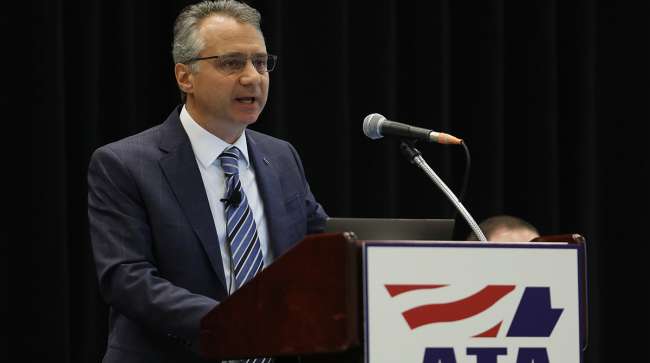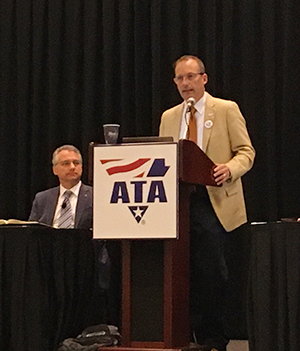Staff Reporter
Specialty Trucks, Medium-Duty Poised to Propel EV Growth, Experts Say

[Stay on top of transportation news: Get TTNews in your inbox.]
NASHVILLE, Tenn. — There are a variety of specialty and medium-duty applications that can propel deployment of electric trucks in commercial settings, experts said during an Oct. 24 panel discussion at American Trucking Associations’ Management Conference & Exhibition.
“The smaller the truck, the lower the battery, the less charging — that’s a simpler and more ‘early adopter’ truck,” said Mike Roeth, executive director at the North American Council for Freight Efficiency. “We believe step vans, box trucks [will] scale probably faster than a lot of us think. Medium-duty and smaller.”
During research NACFE has conducted on EV adoption, Roeth noted that some companies see terminal tractors as a good application for electric truck deployment. He noted the power demands are low since they don’t travel very fast and remain in the same area.
“There’s a lot to consider here,” Roeth said, noting that the company spoke with 91 people across 13 companies. “What we learned is that there’s just a lot of things to consider. Some are easy, some are hard.” Among drivers, there was overwhelming approval for the quietness of electric trucks. Drivers also said they felt safe in the vehicles.

Roeth describes opportunities for EV adoption. (Connor D. Wolf/Transport Topics)
“This will likely happen, in our opinion, quicker for medium-duty than many of us think,” Roeth said, noting that Class 8 has greater needs. “We need more range, we need less weight, we need a lot of cost savings to get there, but some heavy-duty tractors do the job today,” he said. “Anheuser-Busch runs a bunch of electric trucks in beverage. They’re making it work right now, really well, in Class 8 tractors.”
PepsiCo is one fleet that has been exploring EV trucks as well as renewable energy, and has worked closely with NACFE on its Run on Less demonstrations for both diesel-powered and electric trucks.
“As we look at the different opportunities, we don’t have a one-size-fits-all kind of a solution as we take these products to market, nor will we have a one-size-fits-all solution as we transform the fleet as well,” said Ken Marko, senior national fleet engineer at PepsiCo. The company has a goal of reducing its greenhouse gas emissions 75% by 2030.
“We’ve got to be very aggressive looking at different technologies, and focusing on zero-emission technologies,” Marko said. “We’re investing and we’re spending a lot of resources to work with suppliers to develop these technologies, and make sure they’re suitable for the market.”
Steve Mignardi, vice president of on-highway market development at Daimler Trucks North America, noted that global environmental policy is also motivating the push toward electrification.
“We are in a transformation and there are many reasons,” Mignardi said. “One is the environmental factors. We all want to breathe clean air.”
Mignardi noted that government policy and regulations are also driving the transformation. He noted that total cost of ownership comes into play since government grants and programs can help ease the costs associated with developing and purchasing the electric trucks.
Want more news? Listen to today's daily briefing below or go here for more info:


